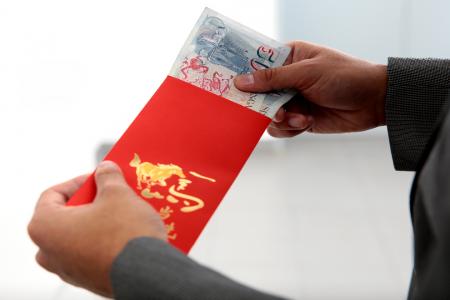The dos and dont’s of hongbao - what you need to know ahead of CNY 2022
If you’re a newlywed, then Chinese New Year is about to get a whole lot different for you.
Gone are the days when you simply showed up to various homes, ate kueh tart and sat around waiting for one relative after another to present you with hongbaos. Your only concern: will I get more money than I did last year?
Like a journalist who leaves his trade and moves into the PR industry, now, YOU are the one giving the mooncakes, or in the case of CNY, the red packets. And there is a litany of rules and customs to abide by.
Fret not, for here is a brief guide to hongbao-giving – the who, what and most importantly, how much.
Who gives and who gets
Simply put, hongbao is traditionally given out by married couples. There are some who believe that those in their first year of marriage get a pass, but this varies among families. So be sure to check with yours.
The usual recipients are parents, children and single adults (who are not well-known millionaires).
There really isn't an age limit to receiving hongbao, but there are some who feel that receiving them in your late 30s is a little awkward – for both giver and recipient. Some families even draw the line when their “kids” start earning and living on their own.
Also, people don’t usually hand out hongbao to their colleagues. So if you see unmarried Agnes who works in marketing at some gathering, you don't have to give her anything more than a hello.
Now would you give a wad of cash stuffed in a red packet to your spouse? Well, that would seem odd. Plus, imagine the ramifications if you “undergave”? Better don’t.
What is the right amount?
Firstly, odd-number amounts are considered inauspicious. To that end, so is the number 4, which in Chinese sounds like “death”, and thus infers misfortune.
Apparently, Teochews do not see “4” as bad luck, and so some of them don’t mind a $4 hongbao. But these are really just unconfirmed whispers…
There is no hard and fast rule for minimum amounts, and it really should come down to how much you can afford. That being said, $6 is generally a good starting point.
Your parents, in-laws and grandparents should receive the most – as a sign of respect and gratitude – so anything above $200 is ideal.
Siblings and your own children can receive about $50 to $200 (depending on their ages), while distant relatives such as cousins, nieces and nephews can get between $10 and $100.
Then there is the cleaning auntie, domestic helper, and the neighbourhood “uncle” that you always greet at the void deck downstairs. Those folks would be happy with anything between $6 and $50.
At the end of the day, it’s a symbolic gesture, so give within your means.
Etiquette
Should hongbao be opened in public? No. Please don't do this.
While it might be customary to rip the wrapping paper off a Chrtistmas gift as soon as you receive one, tearing open your hongbao and counting the cash in front of everyone is considered impolite. (Do remind your kids if you have any).
Give or receive red packets with both hands, and don’t forget those well wishes. A simple “Gong Xi Fa Cai” (wishing you enlarge your wealth) often suffices.
Here’s a controversial one: writing your name on the hongbao.
Some are not adverse to this practice, but if we truly believe that giving is not an act of recognition, then we should refrain from doing so.

Hongbao vs Digital hongbao
The best place to get hongbao “zua” (paper) is at your nearest bank branch. Many retail brands also make and give out their own unique hongbao to customers, so look out for those. And, if you don’t mind spending a little, you can order customised ones online.
For some, it’s important that their hongbao containds fresh, crisp notes straight out of the bank vault (nothing beats the smell of newly minted money). After all, it’s the new year and new things are always preferred.
But while most banks issue new notes before CNY every year, obtaining them often involves a long and arduous wait in a snaking queue.
A convenient and safe alternative would be e-hongbao. But for some reason, the digital method just hasn't caught on among Singaporeans – unlike China where apps like Wechat, Weibo, and Alipay are commonly used to exchange red packets.
Traditionalists, especially elderly folks, aren't likely to be fond of e-hongbao – because the act of giving hongbao from hand to hand is an act of goodwill and symbolises good fortune.
Then again, money is money, right?
Get The New Paper on your phone with the free TNP app. Download from the Apple App Store or Google Play Store now



